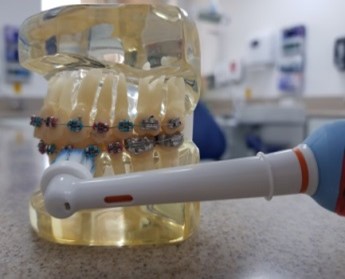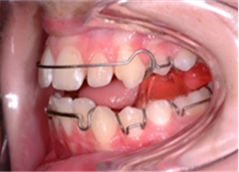Your First Visit to Dorchester Orthodontics
This leaflet has been written for patients attending the Orthodontic Department for the first time.
Why have I been sent an appointment?
This is usually because your dentist has noticed a problem with your teeth. Problems can include:
- Crooked or overcrowded teeth
- Sticking out teeth
- A problem with your bite
- Teeth stuck in the gum
- Missing teeth
- Extra teeth.
How do I get to the department?
When you enter the hospital grounds, follow the signs for East Wing Entrance 3. Find more information on the Travelling to Dorset County Hospital section of our website.
Where can I park?
Car parking across the main hospital site – including the multi-storey car park – operates using automatic number plate recognition.
As you enter our site via Williams Avenue or Damers Road you will need to take a ticket at the barrier to be able to pass through. This also applies if you are dropping off/picking up or a Blue Badge holder.
Parking can sometimes be very difficult. We therefore suggest that you try to use public transport to get here if you can.
Find more information on the Travelling to Dorset County Hospital section of our website.
What will happen at my first appointment?
- You will be asked to complete a medical history form when you arrive
- A member of the team will then look at your teeth (similar to having a check-up at the dentist)
- You will probably be asked to visit the X-ray Department for an x-ray
- You will then see the orthodontist again to discuss the problems with your teeth and the options to solve them.
This will take some time, so please allow approximately two hours for your appointment.
Will I automatically be offered a brace?
There is a national scoring system to identify the people who will benefit most from braces. If your teeth are not bad enough to be treated at the hospital, then you may choose to leave them as they are, or we will explain to you where else you might receive treatment.
Do I have to wear a brace if offered one?
We do not force you to wear a brace; the final choice is yours.
You should think about whether you are willing to wear a brace before you come to see us. Braces are a big commitment, so we will be able to give you some time to decide whether you can make that commitment after you have talked to the orthodontist.
When will my treatment start?
Do not expect a brace to be fitted straightaway. If we are able to provide you with a brace, this will take a few months to organise.
What types of braces are there?
Different braces do different jobs so, unfortunately, you cannot choose the one you want. Sometimes more than one type of brace will be necessary. Your orthodontist will advise you which brace will be needed to help correct your teeth or jaws.
Fixed braces
We mainly use fixed braces (train tracks) which are small metal squares (brackets) glued to the teeth and connected by a wire. We do not offer cosmetic or tooth-coloured fixed braces.
Removable and functional braces
These plastic braces can be taken out for cleaning but must be worn at all other times to work properly.
Headgear brace
Occasionally we ask you to wear a headgear brace. This brace has a head strap that you connect to the fixed or removable brace in the evenings and at night.


Will I need to have teeth removed?
Sometimes teeth need to be removed to make room to line up your teeth or to encourage teeth which are stuck in the gum to come through. Normally the teeth will be removed by your own dentist, with local anaesthetic, just before the braces are fitted.
How long does brace treatment take?
Usually braces are on for 18 months to two years. You will have to come every six to eight weeks to have the braces adjusted.
After the fixed braces are removed, you will need to wear a retainer brace on a long-term basis.
How much will it cost?
Your braces will be free. However, if you break your brace frequently, or lose your removable brace, you may be charged for a replacement.
Are there any risks?
The risks are fully explained before you agree to have your brace fitted. But some of the risks associated with braces are:
- Your teeth can be damaged if you do not clean around the brace properly
- If your diet is poor and contains a high level of sugar
- Because of this, we will not offer brace treatment to patients with the above concerns. If you lose interest in cleaning your teeth during your treatment, then we may remove your brace early for the above reasons.
What are my responsibilities?
Cleaning
As mentioned above, you will have to make sure that the teeth and the brace are cleaned well (after every meal).
Watching what you eat
You will have to cut down on sugary drinks and snacks. Examples of foods that you will have to give up are toffees and chewing gum.
Wearing your brace
It is essential to wear the brace as instructed for the treatment to be effective. If you are asked to wear a headgear brace, or elastics with your fixed brace, then you must wear them for the correct number of hours.
Are the results permanent?
Teeth do tend to move slightly throughout life, so eventually they may become slightly crooked again. To minimise this, we ask you to wear retainers at night time long-term. If you stop wearing them, the teeth are likely to move.
Will I still have to visit my own dentist?
Yes; you will still have to see your dentist for routine check-ups.
If you frequently miss or change appointments, your treatment will take longer or may not be completed.
Where can I find out more information?
More information can be found on our website: dchft.nhs.uk
You can ask the orthodontist any questions you still have.
What happens if I miss my appointment?
You will not be sent another appointment and we will write to your dentist to tell them that you did not attend. You should contact your dentist to ask for another referral to be sent.
Please let us know if you cannot attend your appointment. Another patient may be able to use your slot and we may be able to reschedule your appointment.
Contact numbers
We hope you have found this information useful, but if you have any questions or are worried about anything, please speak to the orthodontic team:
Orthodontic Department (Dorset County Hospital): 01305 2551747
About this leaflet
Author: Pamela Ellis, Consultant Orthodontist
Written: March 2021
Approved: April 2021
Review date: February 2025
Edition: v2
If you have feedback regarding the accuracy of the information contained in this leaflet, or if you would like a list of references used to develop this leaflet, please email patientinformation.leaflets@dchft.nhs.uk
Print leaflet